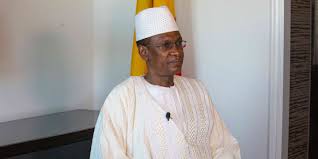
Mali PM Choguel Maiga Remanded in Custody on Embezzlement Charges

 :
| Updated On: 20-Aug-2025 @ 12:12 pm
:
| Updated On: 20-Aug-2025 @ 12:12 pmSHARE
Mali’s former prime minister, Choguel Maiga, has been charged with embezzlement and remanded in custody, deepening political tensions in the West African country as its military leaders intensify a crackdown amid allegations of a coup plot. The charges against Maiga were made public on Tuesday following a Supreme Court hearing. Once a central political figure in Mali’s transition after its second coup in 2021, Maiga was dismissed from office in November 2024 after criticizing the military for failing to provide a clear timeline for restoring civilian rule.
According to his lawyer, Cheick Oumar Konare, no date has yet been set for his trial. Konare insisted they trust the judicial process and remain calm, though Maiga will remain imprisoned until trial proceedings begin. A statement from the public prosecutor accused Maiga of laundering “billions of CFA francs,” amounting to several million U.S. dollars. His arrest, which took place a week earlier, followed a wave of arrests by Mali’s military leaders aimed at suppressing an alleged plot within the armed forces to overthrow the government.
Alongside Maiga, nine of his former colleagues from his premiership also appeared in court. Two of them were formally charged, while some were acquitted and others still await hearings. This is not the first time a high-profile leader has faced detention: earlier in the same month, former prime minister Moussa Mara was imprisoned after expressing support for jailed critics of the military on social media.
Mali has endured deep instability since 2012, when armed groups linked to al-Qaeda, ISIL (ISIS), and local militias triggered a security crisis. The violence has caused thousands of deaths and displaced up to 350,000 people, according to Human Rights Watch. Discontent over worsening insecurity fueled mass protests in 2020, which ultimately led to the military overthrowing the elected government. Although the junta briefly ceded power to a transitional administration, it staged a second coup in 2021, consolidating its authority under Colonel Assimi Goita, who became transitional president.
Under Goita, the military has reneged on earlier promises to hand power back to civilians by March 2024. Instead, it has dissolved political parties, silenced dissent by imprisoning opposition figures and civil society leaders, and passed new legislation granting Goita a five-year renewable mandate—potentially allowing him to remain in power indefinitely without elections.
Choguel Maiga himself played a significant role in the 2020 protests that toppled Mali’s civilian leadership. Initially, he backed the junta, believing the military would safeguard democracy and restructure the state to prevent future unconstitutional power grabs. However, following his dismissal in 2024, Maiga became one of the junta’s most outspoken critics, accusing it of weaponizing the judiciary to suppress opposition.
International observers and analysts argue Maiga’s arrest highlights the junta’s fragility. Former UN rapporteur Alioune Tine warned that detaining prominent opposition figures, including someone once instrumental in legitimizing the junta, undermines its credibility. He further emphasized that insecurity remains widespread, with al-Qaeda’s affiliate JNIM controlling large parts of Mali. Tine urged President Goita to change course by freeing political prisoners, releasing activists and journalists, and initiating an inclusive national dialogue to restore democracy.
Meanwhile, Mali’s military leadership has replaced Choguel Maiga with General Abdoulaye Maiga, formerly the government spokesman. The political turmoil in Mali has also reverberated across the Sahel region. Inspired by Mali’s example, neighboring Burkina Faso and Niger also experienced military takeovers. Facing sanctions and pressure from the Economic Community of West African States (ECOWAS) to return to civilian rule, Mali, Burkina Faso, and Niger have instead withdrawn from the bloc. Together, they have formed the Alliance of Sahel States (AES) and established a joint 5,000-strong force to combat insurgent groups operating across their borders.
In summary, Choguel Maiga’s arrest marks another chapter in Mali’s deepening political and security crisis. Once a supporter of the military, he is now one of its most vocal opponents. His detention reflects the junta’s tightening grip on power, its unwillingness to cede authority, and the growing instability that threatens not only Mali but the wider Sahel region.